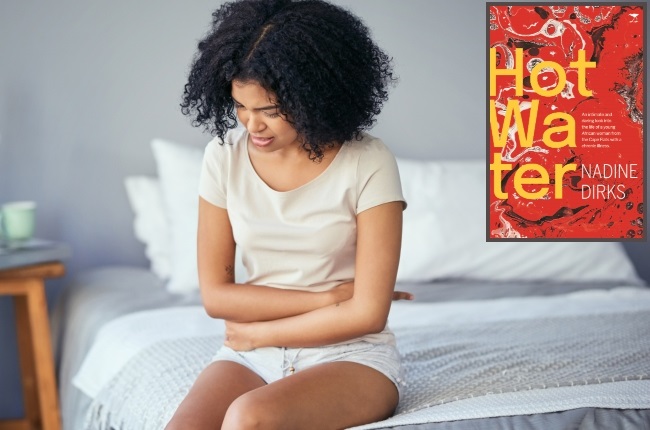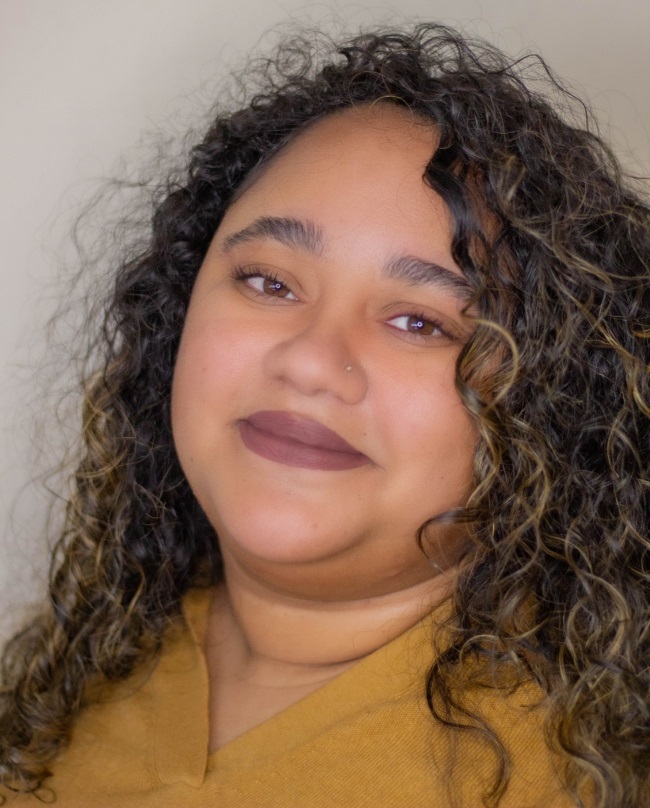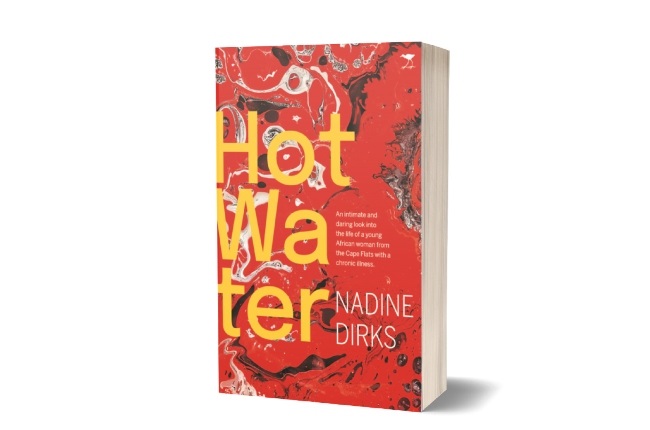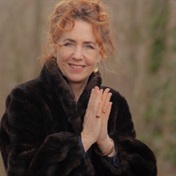
She got her period for the first time at age 11 and from that day all hell broke loose. Since then Nadine Dirks has been in constant, debilitating pain, and unable to do many things that other people take for granted.
In her new memoir, Hot Water, the Cape Town writer and activist shares her turbulent journey with endometriosis. It’s a disease that affects women and occurs when tissue similar to the lining of the uterus grows in other parts of the body, especially the pelvis.
In Nadine’s case it even spread to her kidneys, bowel and resulted in so much inflammation in her abdomen that her one lung collapsed. But for years she was fobbed off by doctors, in both the public and private sectors, who refused to take her condition seriously.
"If I am being completely candid, ever since I was introduced
to the importance of my oven, people have continued to show me how important my
oven is to them. From congratulating me on my first period to being concerned
about my ability to conceive. It’s been a repetitive conversation about my oven
and not in a good way.
Whenever someone speaks to me and tries to figure out how I feel about being chronically ill, especially with an issue that affects my reproductive health, they tend to ask me about babies and a husband. It is bizarre how people manage to project their lives and experiences onto someone else. Now, after everything I’ve been through, reader, do you think a marriage and children are the first things on my mind?
If I were to get married, I would want to get married to someone who cared about me as a person, and not my reproductive abilities. As for a baby? Surely, we have enough babies on this earth who need parents?
No one ever asks me, ‘But what do you regret? What have you found challenging with a chronic illness? The answer is simple: My ability to do things. My symptoms started so early in my life that, honestly, I don’t remember what it’s like to play, to do things my peers were doing. I don’t recall being able to run around in the hot sun with the loose sand of the Cape Flats beneath my bare feet.
I didn’t get to play tok-tokkie on the neighbour’s doors before bolting to hide behind an aunty’s malva bushes, I couldn’t play drie blikkies or seetle-seet with my friends and cousins because I couldn’t keep up. Those are the things I missed out on; those are the losses that I most regret because it stole my childhood.
I never got to try out for school athletics with my friends or do the physical aspects of PE classes with my classmates. I have had to cancel on fun activities with my friends because I had my period and just felt blinded by the level of pain I was in. I would contemplate whether I should force myself and join my friends but I knew I couldn’t participate. It is a catch-22 situation: either I go and try to enjoy myself through the pain or I stay home and feel down and like I was missing out.
Endometriosis has made me a bystander. I don’t remember what it is like to live without back pain because it was one of my first symptoms. This feeling of being a bystander in my own life hasn’t gone away at all, it is a feeling that has lingered below the surface since I was a child.
In high school when all my peers were attending parties, going to the beach together, playing sports and sneaking into clubs and bars, I was at home, with my hot water bottle, tea, pain killers and a book. I missed out on so many milestones and experiences that form part of the overall experience of being a young person exploring and adventuring.
When my friends arranged hiking trips, instead of being honest about my abilities, my instinct was to just pretend that I didn’t like to hike and that it sounded boring. In reality, I would sit at home watching their social media updates and long to be hiking and having fun with them.
Endometriosis cut my matric ball short because I was in too much pain to stay and keep dancing with my friends. Instead, I had to go home, take a hot bath, prepare a hot water bottle and take pain medication while watching my friends’ social media updates.
My first year of high school, I joined the Junior Rangers and
trained with nature conservationists at the South African National Parks. I was
elated to be chosen to join the programme and hang out with other teens who
were interested in the environment but I just couldn’t keep up and hop on rocks at the beach, go hiking up Slang Kop
to look for blooming ericas, or walk for hours on end. I ended up leaving the
programme after I was scolded for missing several classes. Each time it was
because of my period and I was in horrible pain and bleeding heavily. I was heart-sore to have
another aspect of my life swiftly come to an end.
Living with endometriosis means that I have mastered seeming like I am doing fine when I am struggling and in severe pain. I would not mention it, because I didn’t want anyone feeling bad for me, and I didn’t want to burden others and spoil their fun. This disease has robbed me of celebrating many important milestones and enjoying many experiences. It has made every day a challenge – a challenge to keep up, to keep a brave face, to power through the pain.
These losses have made me a stranger to my peers because they can’t relate to me, as we don’t enjoy the same things or frequent the same places. How do you relate to a 21-year-old who is in too much pain to get up, and spends her evenings in bed, with a book and a heating pad? By the time I was done for the day and my body was complaining about the smallest amount of activity, my peers were only just getting ready for the club. I don’t even know if I like clubs. I find them loud, crowded, stuffy and hot but having the choice made for me as to whether I can go or not is what bothers me most.
Endometriosis has shattered so many dreams of mine. At one point in high school I was passionate about food and wanted to go to culinary school or to study medicine and become a doctor. I was so set on my career options and even got brochures for courses to share with my parents, who always seemed to get unusually quiet when I mentioned what I wanted to pursue. Eventually they had to be honest with me because I was in denial about my abilities. My mom looked at me with sadness and said, ‘Nadine … you can’t be a chef or a doctor, it’s not realistic . . . How will you manage jobs that require you to be on your feet, running up and down for hours on end? It won’t work.’
I looked at her with anger because I felt like she was crushing my dreams. I looked over to my dad, hoping he would intervene and talk some sense into my mother who had clearly lost it. My dad looked at me, and was silent for a few seconds before saying, ‘I agree, you can’t do a hospital in-service or the pressures of being on your feet in a hot kitchen for hours, it will just cause your symptoms to flare.’
I stormed off to my bedroom in anger before the hot tears started streaming down my face. ‘How could they be so mean and unsupportive?’ I asked myself. I was gutted and had no plan B. What was I going to do if I couldn’t be a chef or a doctor? Why couldn’t I just do it and then decide if it is for me? I now realise that for my working-class parents, who had managed to leave their lives in a shack in gang-infested Hanover Park as a means to provide better for their children, allowing me to see for myself just wasn’t a financial option. I know it shattered them knowing they could not provide more opportunities and even made them feel like they had failed me because they just didn’t have the financial freedom to allow me to explore.
By the time I started university, I had just been diagnosed and operated on a few months prior. I remember bleeding every single day during my first year of university to the point of getting a diaper rash from the constant use of night pads. The feeling of being a bystander and not truly experiencing university and my early twenties continued. I would listen to my friends and classmates talk about their university experience and freedoms and it was so different to mine. Most were attending lectures, getting ready for the club and somehow fresh as a daisy the next morning for lectures. I marvelled at them because I felt like I was hungover most days.
They would whip out their phones and show videos and photos of themselves in Long Street, drinking R1 shots, laughing and dancing the night away before inevitably recording someone throwing up outside a sketchy bar. They had the most interesting stories about the people they had met, someone who seemed interested in one of the girls, how they managed to drink for free. It always sounded like they had the most incredible time eating their youth, as the kids say. I would just be the friend who got to look at the photos and videos. In a sense I was vicariously living through them, and experiencing clubs, bars and dancing all night with them through glimpses via photos and short clips. They had inside jokes from their partying that I wasn’t privy to and I had become so accustomed to watching from the side lines that it didn’t bother me all that much.
Living with endometriosis has made me unrelatable to my peers, understandably so. How many twenty-something-year-olds, who ‘look’ healthy but are unable to climb multiple flights of stairs do you know? There aren’t many 19-year-olds who are battling the heat because they’re going through medically induced menopause. I have had to carve out paths for myself in unchartered territory. I couldn’t follow the straightforward ideals and societal expectations of what milestones are meant to look like. I couldn’t experience the phases people talk about, I mean . . . how could I possibly have a clubbing phase? I have had to really soul search and figure out what it is I enjoy, what I can do that my body allows, and I have learned to be patient and kind to myself and my body.
One of the most difficult aspects of endometriosis at this stage and severity means that I am watching myself deteriorate, slowly realising I am unable to do simple things I could do even a year ago, like painting my own toenails. I find myself watching people dance and feeling a sense of sadness and defeat because I love to dance. Dancing was something my sister and I did growing up: we’d turn my sister’s bedroom into a club by turning off the lights, blasting our favourite songs at the time and at some point we even introduced a strobe light to the scene. We’d move furniture to have more room to dance and practice any new dance from music videos. It’s a strange feeling to think back to being able to do certain things with significantly less pain and more ability to now knowing I am unable to do the things I used to do not so long ago. Losing my ability to dance and paint my toenails are just some of the things I wish endometriosis didn’t steal from me in the dead of the night.
Despite the many ways endometriosis has stolen from me, I have had the privilege of choosing other ways to socialise, live, explore, experience and adventure. I have been able to build relationships with people who are kind, considerate and inclusive – friends who understand my limitations and are willing to compromise. I’ve found ways to enjoy music and dance without having to go to a club.
I have explored unconventional ways of communing with others
in ways that are comfortable for me. I am lucky to have been able to figure out
different things to do for fun that suited my capabilities, like going to
brunch, exploring tea tastings or champagne tastings, cooking with others,
binge watching shows with delicious food and snacks, going to markets and even travelling. I have decided
what works for me, and I no longer feel the urge to cause harm to myself in an
attempt to do things I know I cannot do.
I no longer have people around me who are unwilling to compromise. Asking for help from people who care about me has also become easier for me and less overwhelming. Endometriosis is a thief of mobility, pain-free days and overall health but I get to decide how much I want it to control and limit me. I decide what works for me in collaboration with my body and mind, but I will not let a disease make or break my sense of agency and freedom."
Hot Water by Nadine Dirks. Published by Jacana Media. Available in all good bookstores and online. Recommended retail price: R265.00




 Publications
Publications
 Partners
Partners



















